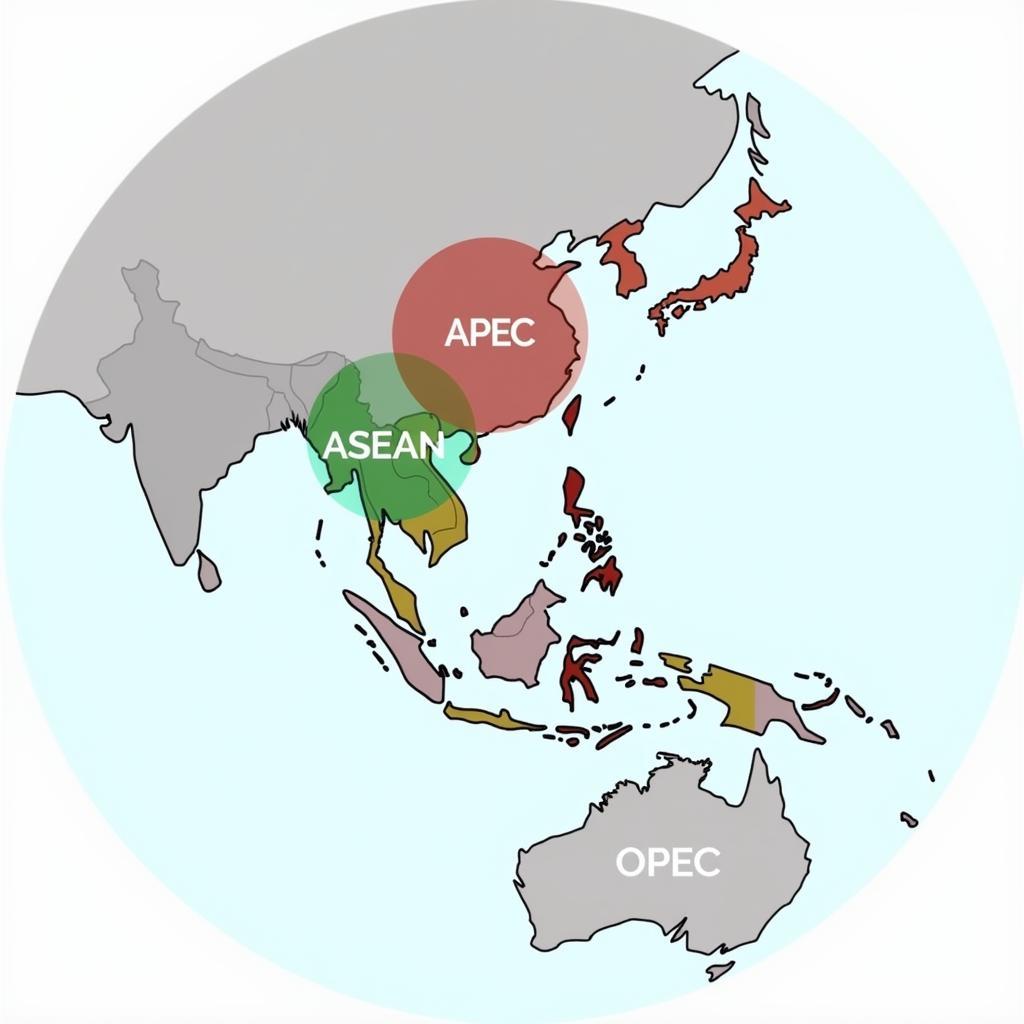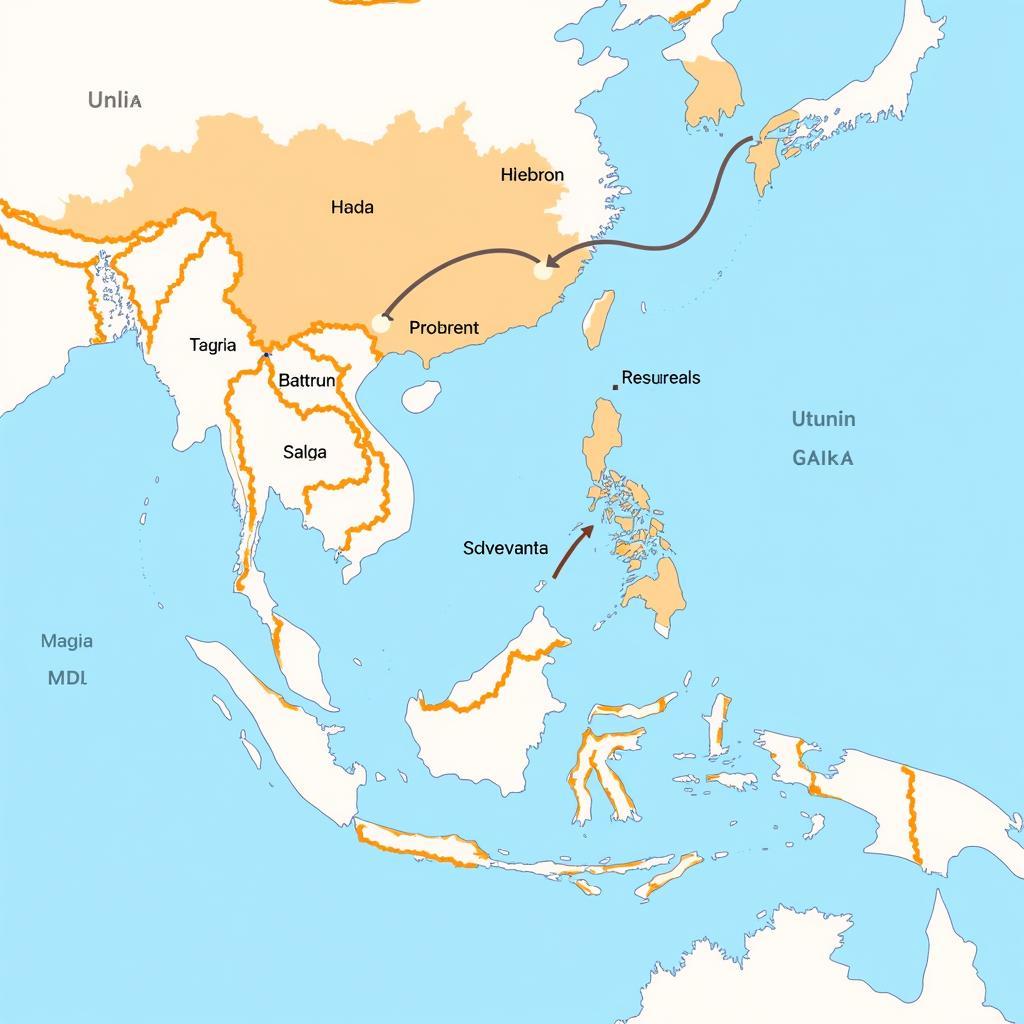Within the complex web of international organizations, APEC, ASEAN, and OPEC stand out as major players on the global stage. While distinct in their geographical scope and areas of focus, their paths often intersect, influencing global trade, economic policies, and energy security. This exploration delves into the intricacies of these organizations, highlighting their individual roles and examining the interplay between them.
 Interconnections between APEC, ASEAN, and OPEC
Interconnections between APEC, ASEAN, and OPEC
Asia-Pacific Economic Cooperation (APEC): Fostering Economic Integration
Formed in 1989, APEC is a forum for 21 Pacific Rim economies, aiming to promote free trade and economic cooperation across the Asia-Pacific region. With a diverse membership, including economic powerhouses like the United States, China, and Japan, alongside developing economies like Vietnam and Peru, APEC represents a significant portion of the global economy.
Key to APEC’s mission is the pursuit of trade liberalization, aiming to reduce barriers to trade and investment among member economies. This commitment manifests in initiatives like the Bogor Goals, which aspire for free and open trade and investment in the region by 2020. Furthermore, APEC facilitates economic and technical cooperation through various programs, fostering development and capacity building within its member economies.
Association of Southeast Asian Nations (ASEAN): A Cornerstone of Regional Cooperation
Established in 1967, ASEAN comprises ten Southeast Asian nations: Brunei, Cambodia, Indonesia, Laos, Malaysia, Myanmar, the Philippines, Singapore, Thailand, and Vietnam. The organization’s core mission is to accelerate economic growth, social progress, and cultural development within Southeast Asia, promoting regional peace and stability.
ASEAN plays a crucial role in facilitating economic integration within Southeast Asia. The ASEAN Economic Community (AEC), established in 2015, aims to create a single market and production base, facilitating the free flow of goods, services, investments, and skilled labor within the region. Beyond economics, ASEAN actively engages in political and security cooperation, addressing regional challenges through dialogue and collaboration.
Organization of the Petroleum Exporting Countries (OPEC): Shaping Global Oil Markets
Founded in 1960, OPEC is an intergovernmental organization of 13 oil-exporting nations, holding a dominant position in global oil production and reserves. OPEC’s primary objective is to “coordinate and unify the petroleum policies of its Member Countries and ensure the stabilization of oil markets in order to secure an efficient, economic and regular supply of petroleum to consumers, a steady income to producers, and a fair return on capital for those investing in the petroleum industry.”
OPEC wields significant influence over global oil prices through its production quotas, impacting energy markets and influencing economic growth worldwide. However, recent years have seen challenges to OPEC’s dominance, particularly with the surge in US shale oil production, impacting global energy dynamics.
The Nexus: Examining the Interplay
The interplay between APEC, ASEAN, and OPEC is multifaceted, with each organization’s actions impacting the others.
- Trade and Investment: ASEAN’s pursuit of economic integration aligns with APEC’s broader goal of free trade in the Asia-Pacific. The success of the AEC could boost intra-regional trade, benefiting APEC economies heavily invested in Southeast Asia.
- Energy Security: OPEC’s oil production policies directly affect APEC economies heavily reliant on oil imports. Fluctuations in oil prices can impact economic growth, inflation, and trade balances within the Asia-Pacific.
- Economic Development: ASEAN nations with developing economies are particularly vulnerable to oil price shocks. Stable and affordable oil supplies are crucial for their economic growth and development trajectories.
 Energy security challenges and opportunities in Southeast Asia
Energy security challenges and opportunities in Southeast Asia
Navigating the Complexities
Understanding the interconnected nature of APEC, ASEAN, and OPEC is essential in today’s globalized world. The decisions made by these organizations have far-reaching implications for regional and global economies, impacting trade, energy security, and economic development.
- Dialogue and Cooperation: Enhancing dialogue and cooperation between these organizations can foster greater understanding and facilitate policy coordination. This collaboration can help address shared challenges, such as promoting sustainable development and ensuring energy security.
- Adaptability and Resilience: The global landscape is constantly evolving, requiring these organizations to adapt to new challenges and opportunities. Embracing innovation, diversifying economies, and promoting sustainable practices will be crucial for long-term resilience.
Conclusion
The intricate relationship between APEC, ASEAN, and OPEC underscores the interconnectedness of global issues. As these organizations navigate a rapidly changing world, their ability to cooperate, adapt, and innovate will be paramount in shaping a sustainable and prosperous future for all.
FAQs
1. How does OPEC membership impact a country’s role in APEC?
While OPEC membership doesn’t directly influence a country’s role in APEC, it can impact its economic policies and priorities within the forum. For instance, an OPEC member facing economic challenges due to fluctuating oil prices might advocate for energy security initiatives within APEC.
2. How does ASEAN’s focus on regional integration affect its relationship with APEC?
ASEAN’s regional integration efforts complement APEC’s broader goal of free trade in the Asia-Pacific. A stronger, more integrated ASEAN can contribute to a more robust and dynamic APEC, fostering economic growth and cooperation.
3. What are some challenges to cooperation between these organizations?
Differing economic interests, political priorities, and geopolitical tensions can pose challenges to cooperation. For instance, trade disputes or disagreements on energy policies can create friction between member states.
Explore More
- Discover more about APEC’s initiatives on promoting sustainable growth: [Link to a relevant article on Asean Media]
- Learn about ASEAN’s efforts in addressing climate change: [Link to a relevant article on Asean Media]
- Explore the latest developments in the global energy landscape: [Link to a relevant article on Asean Media]
Need support? Contact us 24/7:
Phone: 0369020373
Email: [email protected]
Address: Thôn Ngọc Liễn, Hiệp Hòa, Bắc Giang, Việt Nam.


